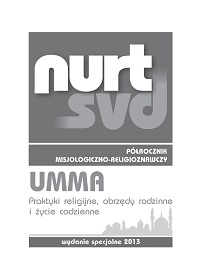Element władzy centralnej w strukturze społeczności muzułmańskiej
The Element of Central Authority in the Muslim Society Structure
Author(s): Rafał MarkowskiSubject(s): Islam studies
Published by: Verbinum
Keywords: Authority; history; Muhammad; caliphs; dynasties
Summary/Abstract: The present article acquaints the readers with the topic of central authority in a Muslim society in terms of Qur’an teachings, but most of all in terms of historical events – it is actually a history of Muhammad’s teachings and his successors in a nutshell, from his first revelations in 610 till the beginnings of 20th century.The authority, as a significant element of each social structure, including the religious one, is wielded by this society’s members; while co-ordinating the rights of individual people the authority enables the realisation of a common good that unifies everyone in a common aim. Qur’an contains not only metaphysical and religious truths – it also comprises principles on political and social organisation of Muslim society (umma), which may all be expressed in one order that the confessors should obey God and his heralds as well all those who are empowered with ordering. Allah, the origin and the donor of all laws and power, is the leader of the confessors’ community. However, God, careful about his community assigned Muhammad with the position of an earthly preacher, guardian and executor of God’s law. The life and teachings of Muhammad and the caliphs – his successors created certain rules of the actual authority for the Muslim society, a pattern for subsequent generations, although the caliphs competed with one another very intensely and their personal and political rivalry led towards the division into Islam’s main two trends: the Sunnism and Shi’ism.
Journal: Nurt SVD
- Issue Year: 2013
- Issue No: special
- Page Range: 13-36
- Page Count: 24
- Language: Polish

